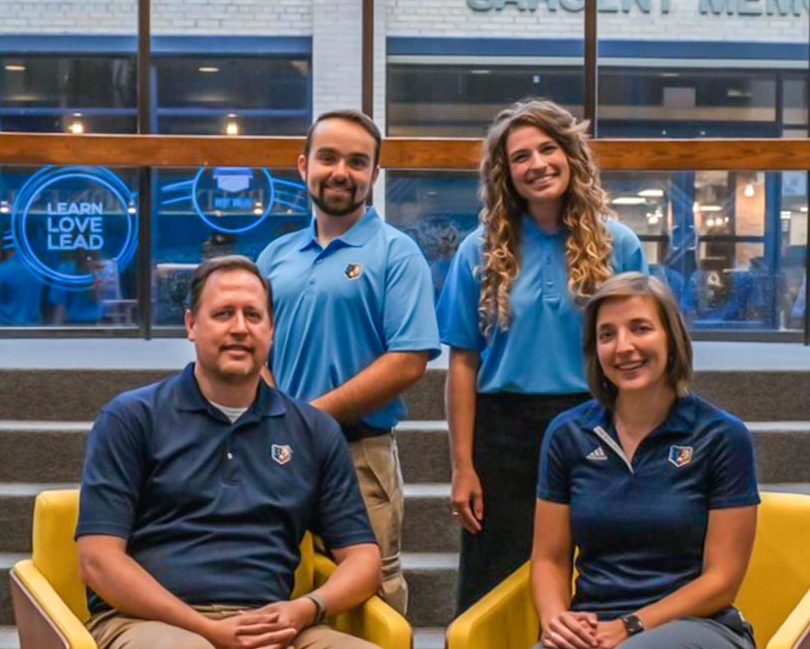Students, faculty and staff members experiencing high stress or adverse situations in life can turn to the Student Care Office, which offers free biblical counseling.
The counselors at Student Care are Dr. Pearson Johnson, the director of Student Care and the men’s counselor; Rachel Dahlhausen, the women’s counselor; John Schaaf, a seminary graduate student and the assistant men’s counselor and Becca Swager, a seminary graduate student and the assistant women’s counselor.
“We provide confidential, voluntary biblical counseling for students, faculty and staff enrolled here at Bob Jones University,” Johnson said. “They don’t have to keep meeting if they don’t want to, but we encourage that and most of our meetings are over the course of several weeks as we deal with particular issues.”
“[And] we talk sometimes to Academy students if there [are] particular issues they’re struggling with,” Johnson said.
Dahlhausen said they occasionally help students by connecting them to a different support office, such as directing them to the Academic Resource Center for help with academic accommodations. “We can be a good resource for a student who’s overwhelmed and not sure where to go, and we can try to help them make the connections they need to make,” she said.
“We serve as a confidential resource for Title IX [a federal law against sexual discrimination] issues as well,” Pearson said. “Any [BJU] employee is required, if they hear about something that sounds like Title IX, to give a report to the Title IX coordinator. Students can come and ask in the Student Care office for advice about what to do if they’re facing harassment or discrimination or some other kind of Title IX situation, and we can give them advice without being reported.”

Photos: Lindsay Shaleen
Student Care assists students dealing with stressful situations and environments, both on and off campus.
“I think our services help students who are dealing with things in life,” Johnson said. “Many of our students bring issues into their student experience from their homes, past relationships, other experiences they’ve had, and once they get at the life of college—which is high stress, high pace—they really need help sorting some of that out.”
And Student Care exists to help students, faculty and staff biblically process these experiences.
“That’s probably the biggest help I think we offer—really just helping students deal with life issues and get help from the Scriptures,” Johnson said. “The Scripture is definitely sufficient to give us what we need for life and godliness. That’s one of our foundational principles in counseling, but we definitely see God changing and helping students in the midst of all kinds of situations.”
Getting help for difficult circumstances quickly can help in the long run.
“I’ve found that it’s really helpful if people are willing to come in before a problem mushrooms into a major issue,” Schaaf said. “Because a lot of times changing your direction by a few degrees at the beginning can save you from ending up in a really bad place and it can keep you on track the right way. And a lot of times that preventative counsel can help a lot on the front end and save people from dealing with a lot of heartache on the back end.”
Biblical counseling looks at health issues of the mind, body and spirit from a unified perspective.
“I don’t necessarily separate out the health issues of physical, mental and spiritual as three entirely separate categories,” Johnson said. “The curse of sin in this world affects our health in all of its ways—mentally, spiritually, physically.”
The process of getting help from Student Care starts by reaching out to them.
“The first thing would be to contact us,” Johnson said. “If we’re here, our door’s open, students can stop in and talk to us anytime.”
To get in contact with Student Care, students can email [email protected] or any of the staff members by emailing or phoning personally. Once in contact, one of the counselors from Student Care will meet with the student, faculty or staff member.
At the first meeting, the counselee and counselor go over a counseling agreement which outlines confidentiality, mandatory reporting, the commitment to meet and the voluntary nature of counseling. The Student Care counselors never discourage counselees from seeking alternative help from the community at large.
“[There are] a lot of different ways in which we help students,” Johnson said. “We will often do a combination of things like reading through a book on a particular topic together, doing a Bible study alongside it, encouraging them [in] their spiritual disciplines, because Bible reading and prayer and fellowship [and] church attendance are part of the normal means of grace.”
“It’s easy when you’re struggling to feel like you’re alone [or] like you’re the only one,” Dahlhausen said. “And that’s not true. I say this to be helpful—you’re not the only one who struggles this way.”





















































